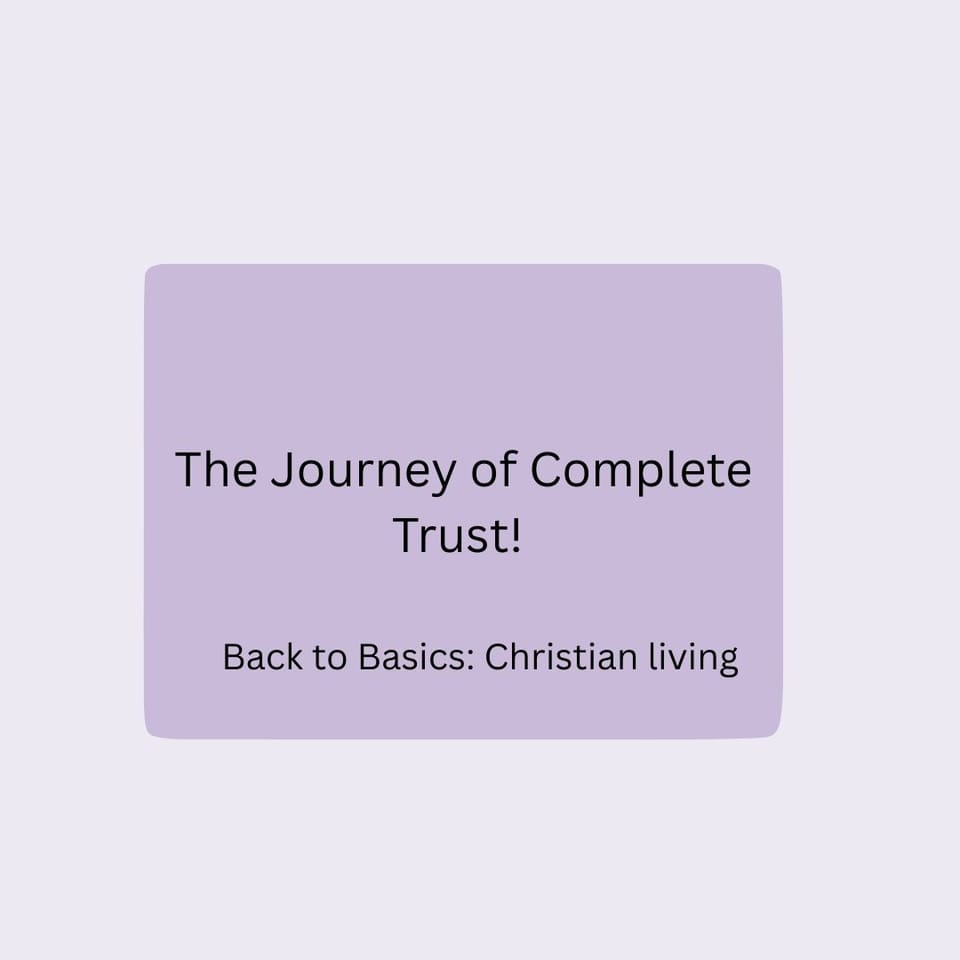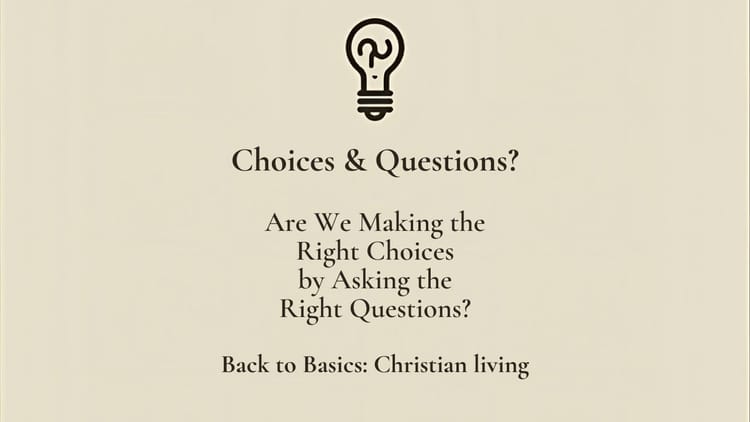The Journey of Complete Trust!

Embracing Divine Dependence
In our fast-paced modern world, where self-reliance and independence are celebrated as virtues, the biblical call to completely depend on God often feels counterintuitive. Yet this principle of total trust stands as one of the most transformative teachings in Scripture, offering a pathway to genuine wisdom, peace, and purpose. Let us explore what it truly means to trust God with our whole heart and how this ancient wisdom applies profoundly to our contemporary lives.
The Foundation of Trust
The cornerstone passage for understanding godly trust comes from Proverbs: "Trust in the LORD with all thine heart; and lean not unto thine own understanding. In all thy ways acknowledge him, and he shall direct thy paths" (Proverbs 3:5-6 KJV).
These words, penned thousands of years ago, speak directly to our human tendency to rely on our own reasoning and capabilities. The Hebrew word for trust used here—"batach"—conveys a sense of complete security and confidence. This isn't about partial trust or faith with conditions attached; it's about surrendering our entire being to God's wisdom and care.
King David understood this profound relationship when he wrote: "Commit thy way unto the LORD; trust also in him; and he shall bring it to pass" (Psalm 37:5 KJV). This commitment represents more than a casual acknowledgment of God—it's about entrusting our very life path to His guidance.
The Challenge to Self-Reliance
The instruction to "lean not unto thine own understanding" presents perhaps the greatest challenge to our human nature. We live in an age where information is constantly at our fingertips. We've been conditioned to research, analyse, and make informed decisions based on our knowledge and experience.
While these analytical skills are valuable gifts, they can become stumbling blocks in our spiritual journey when they lead us to prioritise our limited perspective over God's infinite wisdom. The prophet Isaiah reminds us: "Thou wilt keep him in perfect peace, whose mind is stayed on thee: because he trusteth in thee. Trust ye in the LORD forever: for in the LORD JEHOVAH is everlasting strength" (Isaiah 26:3-4 KJV).
Our understanding, no matter how extensive, remains bound by our finite nature and limited perspective. God's wisdom, however, is perfect and complete, encompassing not only our present moment but the entire tapestry of time.
Intimate Knowledge of God
The phrase "in all thy ways acknowledge him" carries deeper meaning than might initially appear. The Hebrew word "yada" implies intimate knowledge—not merely recognising God's existence but developing a deep, personal relationship with Him.
This acknowledgment should permeate every aspect of our lives—career decisions, family relationships, financial planning, and even leisure activities. It's about viewing all of life through the lens of our relationship with God.
Solomon further emphasises this principle: "Commit thy works unto the LORD, and thy thoughts shall be established" (Proverbs 16:3 KJV). This commitment involves bringing our plans before God, submitting them to His wisdom, and allowing Him to establish our thoughts and actions according to His perfect will.
The Promise of Divine Direction
The latter part of Proverbs 3:6 KJV contains a remarkable promise: "and he shall direct thy paths." The Hebrew word "yashar" means to make straight or smooth. This isn't merely about God pointing us in the right direction; it's about Him actively working to remove obstacles and straighten the crooked places in our journey.
This promise doesn't guarantee an absence of challenges or difficulties. Rather, it assures us of divine guidance and purpose in every step we take. As Jeremiah beautifully expresses: "Blessed is the man that trusteth in the LORD, and whose hope the LORD is. For he shall be as a tree planted by the waters, and that spreadeth out her roots by the river, and shall not see when heat cometh, but her leaf shall be green; and shall not be careful in the year of drought, neither shall cease from yielding fruit" (Jeremiah 17:7-8 KJV).
Practical Applications for Daily Living
How do we translate these timeless principles into practical daily living? Here are several concrete ways to implement this trust in everyday life:
- Begin each day with intentional surrender. Take time before your feet hit the floor to acknowledge God's sovereignty over your day. A simple prayer like "Lord, this day is Yours" can set the tone for everything that follows.
- Develop a habit of "prayer pauses" throughout your day. These brief moments where you consciously bring your thoughts and decisions before God don't need to be lengthy—even a momentary redirection of focus can be powerful.
- Establish a systematic approach to Bible study. Follow a reading plan or focus on specific themes relevant to your current life situations. The more we immerse ourselves in God's Word, the more naturally we align our thinking with His.
- Practice spiritual journaling. Document how God's guidance has manifested in your life. Over time, this creates a personal testimony of God's faithfulness that you can return to during challenging times.
- Create accountability partnerships. Connect with fellow believers who can help you stay true to your commitment to trust God. Sometimes we need others to remind us of God's promises when our own vision becomes clouded.
Trust in Every Season
The application of these principles extends far beyond personal spirituality. In our professional lives, this trust transforms how we handle workplace challenges. In our relationships, it helps us navigate conflicts with godly wisdom. In our decision-making, it provides a framework for choosing paths that honour God.
Consider how this trust manifests in different seasons of life. During times of prosperity, it guards against self-reliance and pride. In periods of hardship, it becomes our anchor of hope. When facing major life decisions, it provides clarity and confidence. Even in the mundane routines of daily life, this trust keeps us connected to our divine purpose.
Most importantly, complete trust doesn't mean we never struggle or question. Even the greatest biblical heroes had moments of doubt. What it does mean is that when those moments come, we choose to anchor ourselves in God's character and promises rather than in our fluctuating emotions or limited perspective.
A Continuous Journey
The beauty of this trust principle lies in its timeless relevance. Whether you're new to faith or have walked with God for decades, there's always a deeper level of trust to develop. It's a journey of continuous growth and discovery, where each step of faith builds upon the last.
As we navigate life's complexities, may we increasingly embrace the wisdom of Proverbs 3:5-6 KJV, finding in complete trust not a weakness but the source of our greatest strength. For in trusting God fully, we discover the path to true wisdom, peace, and purpose—the journey of complete trust that transforms not only our circumstances but our very souls…
Key Takeaways:
- Trust in God's infinite wisdom: Recognising that God's perspective transcends our limited understanding allows us to surrender our need for complete control.
- Acknowledge God in all areas of life: True trust involves bringing every aspect of our lives—work, relationships, decisions—under God's guidance.
- God actively directs our paths: When we trust completely, God doesn't just point the way but works to smooth our journey and remove obstacles.
- Practical trust requires daily habits: Begin each day with surrender, take prayer pauses, study Scripture, journal your spiritual journey, and maintain accountability relationships.
- Trust is valuable in every season: Whether in prosperity or hardship, major decisions or daily routines, trusting God provides wisdom, peace and purpose.
- Complete trust is a continuous journey: Even faithful believers continually grow deeper in their dependence on God throughout their lives.





